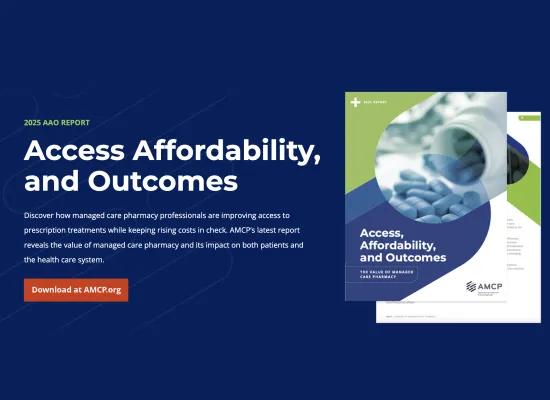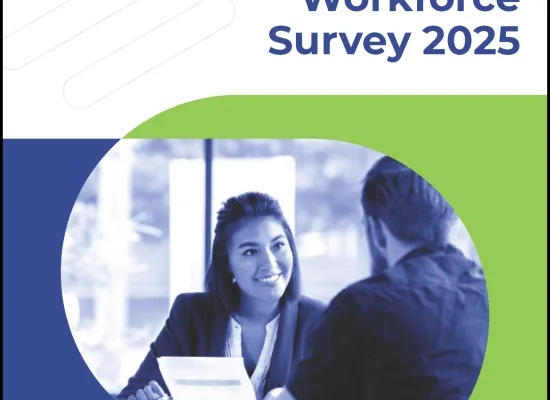
Best Poster Awardees Announced at AMCP 2022 Focus on Reducing Readmissions, the Effectiveness of Mail-to-Prescriber Letters, and Improving Medication Adherence
Alexandria, Va., April 13, 2022 — AMCP Foundation and CVS Health proudly announced the recipients of AMCP Foundation Best Poster Awards at AMCP 2022. This semiannual competition culminates twice per year at AMCP national meetings, with awards for new practitioners presented in three categories.
“In managed care pharmacy, decision-makers rely upon real-world evidence to design interventions, improve patient health and reduce health care expenditures,” said Paula J. Eichenbrenner, MBA, CAE, AMCP Foundation executive director. “The innovative and practical studies we are recognizing point to significant clinical and financial benefits. That these inquiries were led by trainees makes them even more impressive!”
Congratulations to the honorees for their important contributions to evidence-based medicine.
Best Poster Presentation by a Resident or Fellow: “The Impact of a Health System Specialty Pharmacy's Role in Reducing Readmissions and Improving Access to Medication Among Heart Failure Patients” by Steven J. Fosnight, PharmD, Pharmacist Resident, Trellix Rx, Ravenna, Ohio
This research illustrates the value that clinic-based specialty pharmacists bring in improving clinical outcomes and access to care for patients, while managing costs to health systems. Patients with heart failure with reduced ejection fraction (HFrEF) may benefit from treatment with sodium glucose co-transporter-2 inhibitors (SGLT2i) or sacubitril/valsartan (per guidelines from the American College of Cardiology/American Heart Association, or ACC/AHA). However, these are costly medications which may not be appropriate for all patients. In this study, retrospective chart reviews demonstrated clinical improvements for 212 patients enrolled in specialty pharmacy services. Documented clinical outcomes included 433 fewer inpatient days, 18 fewer all-cause 30-day readmissions, and a 48% decrease in heart failure hospitalizations. These decreased admissions were estimated to save the health system $136,494 in health care costs. Additionally, 89% of prior authorization turnaround times transpired in less than 24 hours – further underscoring the patient-centered benefits of pharmacist-delivered care.
Best Poster Presentation by a Student Pharmacist: “Effectiveness of Mail-to-Prescriber Letters to Facilitate Deprescribing of GLP-1 Agonist and DPP-4 Inhibitor Duplicate Therapy” by Trey Jones, PharmD Candidate, University of Wisconsin–Madison School of Pharmacy, Madison, Wisc.
Featuring an effective and low-cost intervention to reduce duplicative therapy through deprescribing, this study focused on the chronic disease of diabetes. 1,109 plan members had paid claims for at least one therapy within the GLP-1 agonist class and one within the DPP-4 inhibitor class, although this combination is not supported by clinical guidelines to achieve glycemic control in patients with type 2 diabetes. In fact, coadministration of these two classes is clinically inferior to alternative combinations and may cause adverse effects. Letters detailing paid claims of targeted drugs and safety risks of duplicative therapy were mailed to prescribers. The proportion of patients no longer on duplicate therapy post-intervention was reduced by 17% (n=190). This clinical reduction resulted in secondary financial outcomes: firstly, to patients, an out-of-pocket savings of 28.2% (p < 0.001); and secondly, to the health plan, a savings of 21.9% (p < 0.001). Deprescribing and communicating with care teams offers potential clinical and financial benefits in many other disease states.
Best Poster Presentation by a Graduate Student: “A Motivational Interviewing Intervention to Improve Adherence to ACEI/ARBs Among Nonadherent Patients with Comorbid Hypertension and Diabetes” by Zahra Majd, PharmD, PhD Candidate, University of Houston College of Pharmacy, Department of Pharmaceutical Health Outcomes and Policy, Houston, Tex.
Poor adherence contributes to worsening patient health conditions and increased burdens upon health care systems. The ACC/AHA and American Diabetes Association (ADA) guidelines recommend angiotensin-converting enzyme inhibitors (ACEIs) and angiotensin receptor blockers (ARB) for patients with hypertension or diabetes. However, the cardioprotective benefits of these therapies is maximized only when adherence is achieved and maintained. Motivational interviewing (MI) is a behavioral technique used to improve patient adherence. The investigators identified 642 nonadherent patients enrolled in Medicare Advantage Plan and separated them into an intervention group to receive MI (n=214), and a control group (n=428). The primary outcome of adherence 6- and 12-months post-intervention was measured by proportion of days covered (PDC). Patients who received ≥4 calls were significantly associated with better adherence (at 6-months, β=1.03, p=0.02; at 12-months, β=0.09, p=0.01). This improvement in adherence was even visible despite gaps in follow-up care due to COVID-19.
Since its inception in 2002, AMCP Foundation's Best Poster Competition has provided an opportunity for student pharmacists and new practitioners to demonstrate analytic proficiency, poster development, and technical skills. Best Poster Awardees receive $500 and a one-year AMCP membership. AMCP Foundation also periodically invites established researchers to compete for topical Best Poster Awards.
Appreciation is extended to funding partner CVS Health, the Journal of Managed Care & Specialty Pharmacy, the Best Poster judges, and research preceptors who support AMCP Foundation's efforts to recognize future pharmacists and new practitioners conducting transformative research.
About AMCP
AMCP is the professional association leading the way to help patients get the medications they need at a cost they can afford. AMCP’s diverse membership of pharmacists, physicians, nurses, biopharmaceutical professionals, and other stakeholders leverage their specialized expertise in clinical evidence and economics to optimize medication benefit design and population health management and help patients access cost-effective and safe medications and other drug therapies. AMCP members improve the lives of nearly 300 million Americans served by private and public health plans, pharmacy benefit management firms, and emerging care models. Visit www.amcp.org.
About AMCP Foundation
Established in 1990, the 501(c)3 nonprofit AMCP Foundation is the philanthropic arm of the Academy of Managed Care Pharmacy (AMCP). It exists to advance collective knowledge and insights on major issues associated with the practice of pharmacy in managed care health care settings. By facilitating innovative research initiatives and providing educational opportunities to learn about managed care pharmacy, the AMCP Foundation invests in the future of managed care. Visit www.amcpfoundation.org.
About CVS Health
CVS Health is the nation's premier health innovation company helping people on their path to better health, by making quality care more affordable, accessible, simple and seamless. The Company has ~9,900 retail locations, ~1,100 walk-in medical clinics, a leading pharmacy benefits manager with ~102M plan members, a dedicated senior pharmacy care business serving 1M+ patients/year and specialty pharmacy services. We offer a leading standalone Medicare Part D prescription drug plan and Medicare Advantage offerings. https://www.cvshealth.com.
Featured News & Resources
See Full CalendarAward Applications Open
AMCP eLearning Day: Nexus Encore
AMCP 2026 Registration Opens
Upcoming Events
AMCP offers a wide variety of educational opportunities, from events and webinars to online training.







